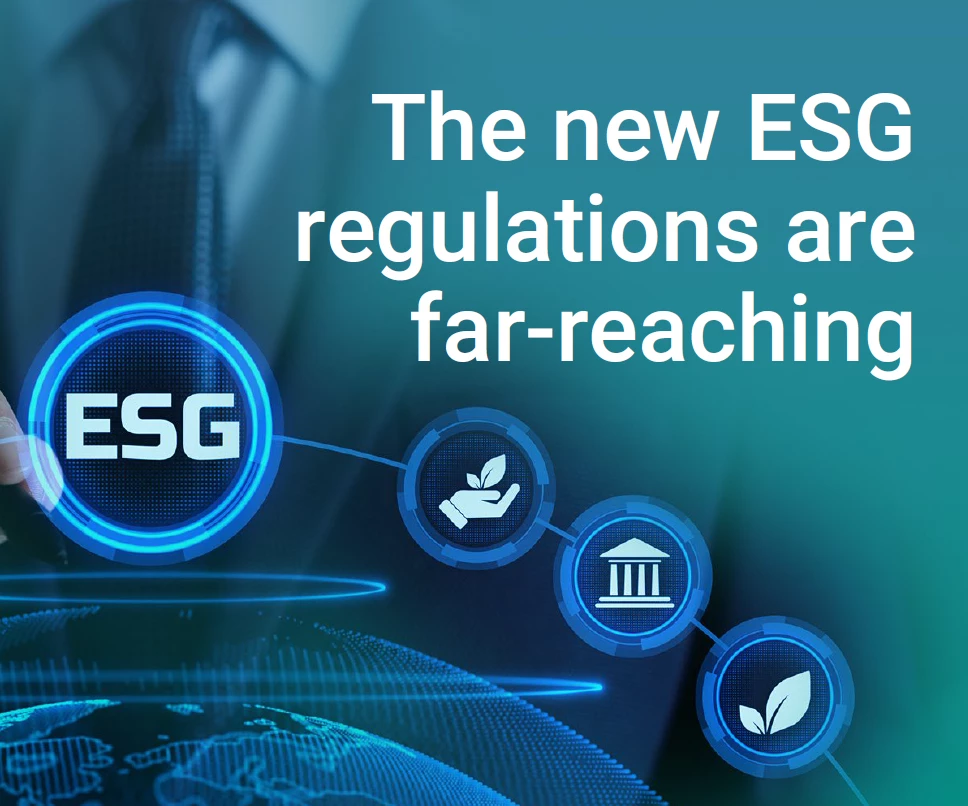Data and Transparency – the Key to Navigating ESG Regulations in Europe
Financial institutions and corporates are under increasing pressure to provide sustainability data that is clear, consistent and transparent, not just for their own benefit, but also for the benefit of their customers and investors.

Environmental, social and governance (ESG) reporting is now high on the agenda in Europe. Financial institutions and corporates are under increasing pressure to provide sustainability data that is clear, consistent and transparent, not just for their own benefit, but also for the benefit of their customers and investors, and to comply with the growing demands of the regulators.
CSRD
For corporates, ESG data is becoming increasingly important in order to permanently track their own sustainability scores and make them available to capital providers. ESG data is also key in being able to benchmark against others in the industry segment in which they operate.
The key regulation impacting corporates is the Corporate Sustainability Reporting Directive (CSRD), which will be introduced in three stages between 1 January 2024 and 1 January 2026. CSRD aims to address shortcomings in the existing rules on disclosure of non-financial information, by requiring all large and/or listed companies to report on sustainability issues such as environmental rights, social rights, human rights and governance factors. CSRD also demands the publication of this sustainability information - certified by an accredited independent auditor or certifier - in a dedicated section of company management reports.
SFDR
Financial institutions in Europe also face a raft of new ESG regulations. The most important of these is the Sustainable Finance Disclosure Regulation (SFDR) which was introduced in March 2021. This regulation imposes new risk disclosure obligations on financial services firms, including asset & wealth managers, insurance companies and banks offering portfolio management services.
Under SFDR, firms are required to disclose how sustainability risks are accommodated within their investment process, what metrics they use to assess ESG factors, and how they approach investment decisions that might result in negative effects on those factors. According to Article 7 of SFDR, which divides financial products into three categories - those with environmental or social characteristics (Article 8), those with an intended sustainability effect (Article 9), and other financial products – firms are now required to state how sustainability risks are measured and weighted, and to justify if aspects of sustainability are not taken into account.
Key to SFDR is the new EU Sustainable Finance Taxonomy Regulation, a classification tool being introduced in 2022, which defines the benchmarks for sustainable economic activities in a uniform and comparable manner, and which sets strict standards to prevent ‘greenwashing’.
Other regulations
Existing regulations such as MiFID II, UCITS and AIFMD are also being amended to take ESG considerations into account. Under new MiFID II obligations, for example, firms will need to demonstrate sustainability factors in the policies and procedures used to provide advice. And on 1 August 2022, both UCITS and AIFMD published new delegated acts to include sustainability factors and risks.
How Infront helps
In order to comply with all of these regulations, it is essential that firms have the necessary sustainability data available, and that they have the ability to process that data. This is where Infront can help, by providing an efficient, pragmatic and compliant solution.
The Infront ESG module and ESG data are available in several of the Infront solutions, enabling firms to identify and implement the necessary adjustments to individualised workflows, reports, and evaluations at an early stage. ESG data can also be integrated directly into a client’s own infrastructure via the Infront Data Manager feed.
For portfolio managers, the system fully supports pre-contractual and regular documents, as well as corresponding investment processes (e.g., pre- and post-trade checks) within the framework of the Disclosure Regulation. Infront also provides ESG scores, which can be used in the investment and client service processes, and which are also evaluated alongside traditional metrics like earnings, cash flow, and other financial ratios when reporting.
In summary, navigating the new and evolving ESG regulations in Europe is a challenging proposition. But having a solution that draws upon consistent, meaningful ESG data and presenting that data in a transparent and compliant manner, goes a long way towards helping firms address those challenges.





 Back to all news
Back to all news
